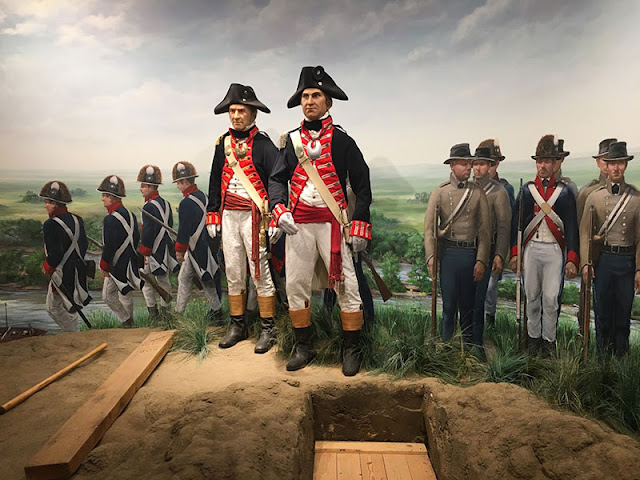“Hurry,” Capt. Clark said, and that was all he needed to say because everyone knew—as they’d known for days—that Charley Floyd was in the kind of trouble from which there could be no easy escape. What Clark ordered was a long shot—everyone knew it, but no one said it. It was Sgt. Floyd, after all, and every last man liked Charlie.
“Go down, get some water,
and stir up the fire so we can that water hot,” Capt. Clark had told them.
They were up high on a
wide and grassy bluff above the river, at the confluence of yet another, this
one much smaller, maybe forty rods wide, Lewis had noted. It would be easier by
far for the men to get what they needed from the smaller tributary coming down from
the north.
“Long ago already,” Lewis
told Clark, “I had in in me that we weren’t going to get out of this without
some losses.” He wasn’t looking at Capt. Clark, didn’t have to, didn’t mean to.
What he said was pure confession, not meant for anyone but maybe himself and
the Almighty. “Had to happen, I suppose. I just hope the next one, when it
happens, is somehow easier.”
“Don’t count on it,” Clark
told him. “Lot of river between here and the sea.”
It was Clark’s idea to
give Charlie Floyd a warm bath yet. Everyone knew a bath had nothing to do with
making the sergeant well, just might make what was coming less of something no
one wanted to name. Young and tough and not afraid of anything, they were; but unaccustomed
death, too, when it lay right there before them.
Hard, hard work it had
been getting this far upriver from St. Louis. If they weren’t poling all that tonnage
through the current, they were on shore tugging it up with ropes. They soon
understood that they were part of good bunch. At night, over a fire--lots of
laughs, a healthy swallow or two of whiskey, and tales—no end to the tales the
old river rats could spin.
The moment Sgt. Floyd
complained about the pain, they believed him; the man wasn’t someone anyone had
to babysit. Besides, he’d been getting weathered, not by all the work but by a
body they could see was fighting an enemy they could see too clearly and hear
in a rattling cough.
Once they got the water
back up the hill, they filled every last vessel they could, leaned it into the
fire and waited until they could see the steam rising, then poured it into a
tank and went for Floyd, who was already on his way to glory.
“I’m going away,” he told
Capt. Clark. “You be sure to write me.”
They never got him into
that bath.
Somewhere, not close, a
couple of coyotes let them know they were near. No wind. The river flowed along
as if nothing at all was happening up there, nothing that hadn’t happened a
thousand times before.
Capt. Lewis couldn’t help
thinking about that, the cruel indifference of this mighty world they were
seeing, all of them stunned with beauty from the moment they started up river.
Tomorrow, there’d be a burial somewhere up here, up above the water, he
thought. They’d leave Charlie Floyd’s body behind where no one would ever find
him, so far from his Kentucky home. Some kind of ceremony they’d have to put
together—they hadn’t planned on someone dying. He and Clark would put words
into the souls of the boys bunched up right now around the campfire in a swell
of silence brand new—and old, really as these hills, old as death itself.
They’d thought the world
of the Sgt. Charles Floyd. Loved him. Once they hit the river again, it would
be impossible not to think they’d left something of themselves in what they’d
dig tomorrow with diligence and care. It’d be silent again, silent still.
It was Lewis’s idea. That
little clear-water river down there feeding the Missouri—they ought to name it
after Charley. They ought to name it after their good friend, Charley—the
Charles Floyd River.

No comments:
Post a Comment